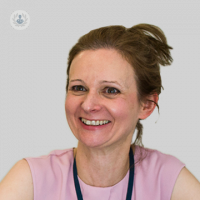What are the symptoms of ovarian hyperstimulation syndrome (OHSS)?
Escrito por:Ovarian hyperstimulation syndrome is a complication which arises as a result of women injecting hormones in order to increase egg production in the ovaries. Fertility specialist, Dr Anna Carby, shares her expertise on this condition.

What are the symptoms of ovarian hyperstimulation syndrome (OHSS)?
Generally, OHSS can be categorised as mild, moderate and severe. The most common symptoms of mild OHSS are bloating and abdominal pain. Moderate symptoms may additionally include vomiting, while severe OHSS can cause dehydration, increasing pain, vomiting, difficulty in breathing and passing only small amounts of urine.
How common is ovarian hyperstimulation syndrome?
OHSS is reasonably common in treatments such as IVF, with up to a third of patients experiencing symptoms from mild to severe. Mild OHSS is very common, whereas severe OHSS is uncommon (1% of IVF cycles).
How is ovarian hyperstimulation syndrome (OHSS) managed or treated?
Thorough assessments of the risks of OHSS can go a long way towards preventing it. Modern protocols, careful dosing and care when preparing for egg collection can prevent the vast majority of cases from happening.
If OHSS does happen despite all of these precautions, treatment includes painkillers, monitoring fluid intake and output. Sometimes a drug called cabergoline may be prescribed. In severe cases OHSS patients may be admitted to hospital so that fluid intake can be closely monitored along with liver and kidney function. Sometimes blood thinners may be used to prevent clots forming, which can be more likely in OHSS.
What causes the condition?
We don’t know exactly what causes OHSS although It is more common in young women with polycystic ovaries and those with a previous history of OHSS, it is thought that “vasoactive” compounds are released in OHSS which alter the structure of blood vessels allowing fluid to leak out and dehydration to occur.
How is it diagnosed?
Diagnosis is achieved through a combination of symptoms, ultrasound scans and blood tests which will all help your doctor determine the severity of the condition.
Dr Anna Carby is an expert gynaecologist and fertility specialist. For further consultation on this or any other fertility-related issue, visit her Top Doctors profile to request an appointment.


